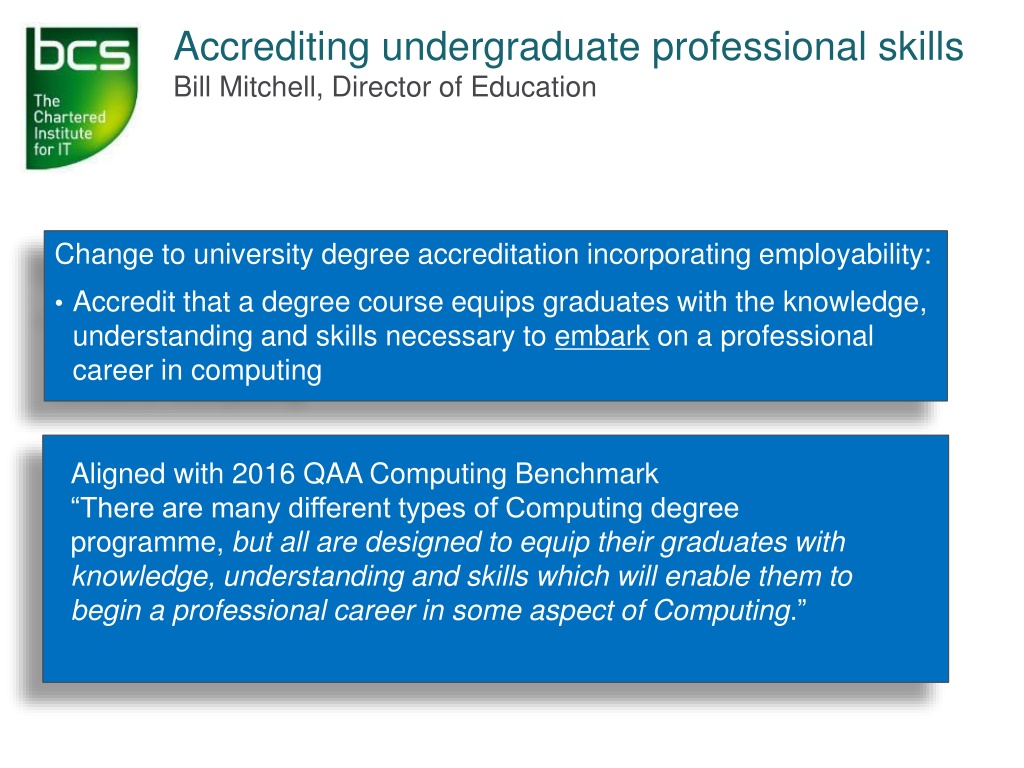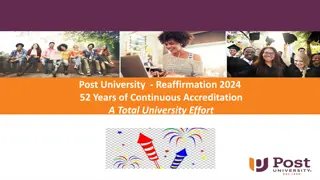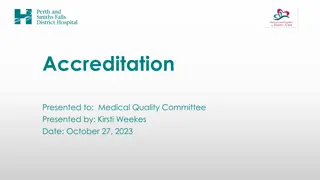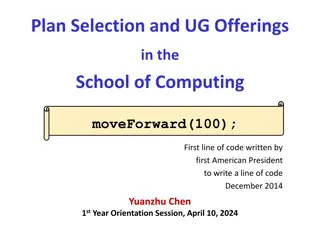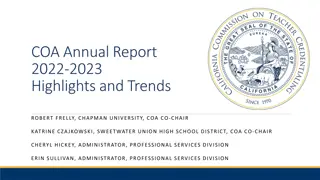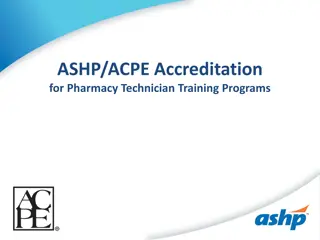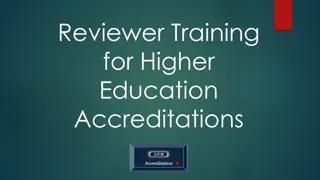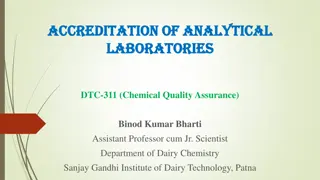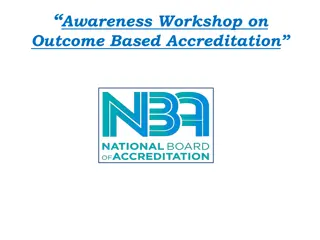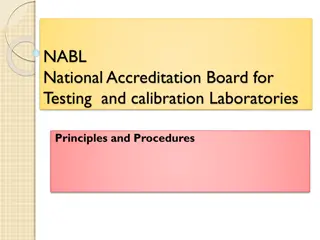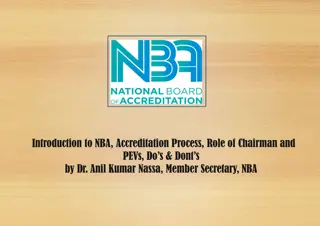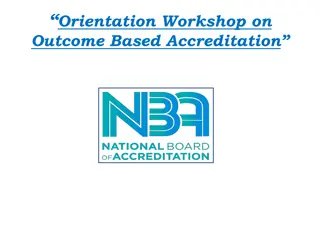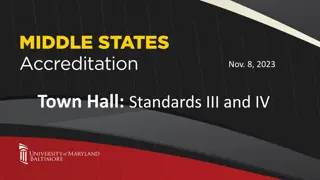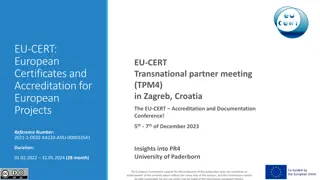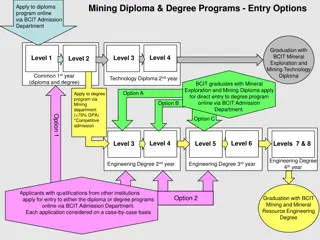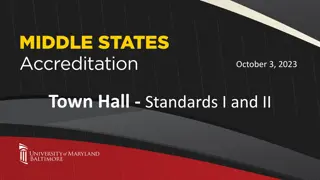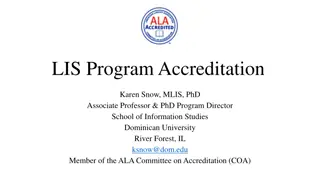Accreditation Evolution for Computing Degree Programs
Bill Mitchell, Director of Education, proposes an evolution in university degree accreditation to incorporate employability skills for graduates pursuing professional careers in computing. The accreditation process emphasizes aligning with national skills criteria, engaging employers, and recognizing individual skills. The evolution includes introducing Professional Skills accreditation alongside Academic accreditation, articulating employer-engaged skills in all degree programs, and linking Professional Skills accreditation to Chartered status. Successful pilots have been completed to streamline the accreditation scheme. BCS is actively collaborating with organizations to shape graduate pathways.
Download Presentation

Please find below an Image/Link to download the presentation.
The content on the website is provided AS IS for your information and personal use only. It may not be sold, licensed, or shared on other websites without obtaining consent from the author. Download presentation by click this link. If you encounter any issues during the download, it is possible that the publisher has removed the file from their server.
E N D
Presentation Transcript
Accrediting undergraduate professional skills Bill Mitchell, Director of Education Change to university degree accreditation incorporating employability: Accredit that a degree course equips graduates with the knowledge, understanding and skills necessary to embark on a professional career in computing Aligned with 2016 QAA Computing Benchmark There are many different types of Computing degree programme, but all are designed to equip their graduates with knowledge, understanding and skills which will enable them to begin a professional career in some aspect of Computing.
Principles of accreditation Accreditation of professional skills against rigorously defined national skills criteria, validated through depth of employer engagement with students on degree course. Accreditation of skills should be of the individual, not of the course. Accreditation should no longer be one size fits all. Employer validation should signpost the career profiles a degree supports in plain language. Accreditation of knowledge and understanding should be based on degree outcomes, and only consider processes if there are doubts about standards. BCS Academy of Computing
Evolution for accreditation Initially offer different academic and professional skills accreditation Continue with Academic accreditation focusing on knowledge and understanding, including professionalism Introduce Professional Skills accreditation: currently for placements and based on RITTech standard BCS Academy of Computing 3
Evolution for accreditation Next: Articulate professional skills developed through employer engagement for all degree programmes, which are equivalent to skills on placements. Consider Professional Skills accreditation for Degree Apprenticeship Linking Professional Skills accreditation to Chartered status Look at accelerated pathway to Chartered status for degrees with Professional Skills accreditation May 19th: workshop with employers and universities to develop these BCS Academy of Computing 4
Accrediting undergraduate professional skills Bill Mitchell, Director of Education Successful pilot completed for new accreditation scheme focus on work placements with Successful pilot completed for streamlining accreditation scheme with
BCS actively engaged with these organisations on shaping graduate skills framework for new accreditation based around employability. Their representatives will be attending May 19th workshop. BCS Academy of Computing 6
Aligning with Degree Apprenticeships Software Engineer Degree Apprenticeship Year 1 ECS401U Procedural Programming ECS404U Computer Systems and Networks ECS402W Professional and Research Themes ECS419U Information Systems Analysis ECS414U Object- Oriented Programming ECS418W Business Modelling Campus Campus Work based Campus Campus Work based BCS Academy of Computing 7
Aligning with Degree Apprenticeships Software Engineer Degree Apprenticeship Year 2 ECS505U Software Engineering ECS524U Internet Protocols and Applications ECS407U Logic and Discrete Structures ECS519U Database Systems ECS518U Operating Systems ECS506W Software Engineering Project Work based Campus Campus Campus Campus Work based BCS Academy of Computing 8
Aligning with Degree Apprenticeships Software Engineer Degree Apprenticeship Year 3 ECS501U C Programming ECS646W Software Development & Quality ECS510U Algorithms & Data Structures in an Object- oriented Framework ECS522U Graphical User interfaces ECS639U Web Programming ECS6**W Compilers Campus Work based Campus Campus Campus Work based BCS Academy of Computing 9
Aligning with Degree Apprenticeships Software Engineer Degree Apprenticeship Year 4 ECS650U Semi-structured Data and Advanced Data Modelling ECS640U Big Data Processing ECS635W Project ECS647U Bayesian Decision & Risk Analysis ECS608U Distributed Systems and Security ECS635W Project (cont.) Campus Campus Work based Campus Campus Work based BCS Academy of Computing 10
Aligning with Digital Apprenticeships QAA Computing Benchmark Skills Software Developer Apprenticeship ability to specify, design and construct reliable, secure and usable computer-based systems can create simple data models and software designs can understand and utilise skills to build, manage and deploy code into enterprise environments BCS Academy of Computing 11
Aligning with Digital Apprenticeships QAA Computing Benchmark Skills Software Developer Apprenticeship ability to evaluate systems in terms of quality attributes and possible trade-offs presented within the given problem can test code and analyse results to correct errors can understand and create basic analysis artefacts, such as use cases BCS Academy of Computing 12
Aligning with Digital Apprenticeships QAA Computing Benchmark Skills Software Developer Apprenticeship ability to plan and manage projects to deliver computing systems within constraints of requirements, timescale and budget can understand and utilise skills to build, manage and deploy code into enterprise environments can respond to the business environment and business issues related to software development can operate effectively in their own business s, their customers and the industry s environments BCS Academy of Computing 13
How to align with the Teaching Excellence Framework (TEF) How much, if at all, should BCS professional accreditation take account of TEF? Employment/destinations: Should BCS regard Destinations of Leavers from Higher Education Survey (DHLE) as valid data or not? BCS Academy of Computing 14
Undergraduate work experience hypothetical case study Example of work experience gained through final year project: Case study: Neural Network to Diagnose Diabetes from Retinal Scan Student is part of team including clinicians and computer scientists Responsible for developing and implementing optimised network based on new research findings Network to be integrated into software tool for medical department to treat patients BCS Academy of Computing 15
Professional skills evidenced on placement. The student can: Understand and apply fundamental principles to create business value Work autonomously under only general direction Influence other members of their team as well as people in other parts of their organisation Build business relationships with customers and suppliers (internal and external). Capable of developing tasks for others against project goals and supervising their implementation. Are these enough to gain professional skills accreditation? Requires expert opinion of employers and academics. 16
